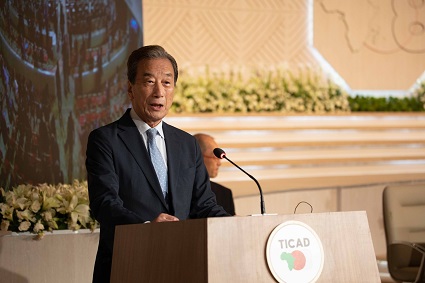[The Fourth Hideyo Noguchi Africa Prize Award Ceremony] Introduction of Laureates
Introduction of Laureates
by Dr. KUROKAWA Kiyoshi, Chairperson of Hideyo Noguchi Africa Prize Committee

Honorable Heads of States and governments, Heads of International Organizations, Excellencies and Distinguished Guests,
On behalf of the Fourth Hideyo Noguchi Africa Prize Committee, I would like to welcome all of you attending TICAD. Please allow me to provide an overview of the selection process for the prize and report on the achievement of this year’s laureates.
Last year, based on the numerous nominations we received from across the globe, the Selection Committees for the Medical Research and Medical Services categories first narrowed down the list of nominees.
Informed by their findings, in March this year, the Hideyo Noguchi Africa Prize Committee reached a conclusion on the most appropriate laureates. In the Medical Research category, we selected Dr. Salim S. Abdool Karim, Director, Center for the AIDS Programme of Research in South Africa (CAPRISA), and his wife, Dr. Quarraisha Abdool Karim, CAPRISA’s Associate Scientific Director. And in the Medical Services category, we chose the Guinea Worm Eradication Program, a global campaign led by The Carter Center in partnership with stakeholders in Africa. We then passed our recommendations to the Prime Minister, who approved the laureates this past June. With the joint award to a husband and wife in the Medical Research category and the award to a program led by an organization in the Medical Services category, this year marks the first time the recipient of either of these prizes has not been a single individual.
Drs. Salim and Quarraisha Abdool Karim are epidemiology researchers who have made extremely important contributions to research into the prevention and treatment of HIV/AIDS. Of particular note on a global scale were their achievements in proving that early deployment of antiretroviral therapy dramatically reduced deaths in patients with both HIV and tuberculosis, and, after identifying the reality of HIV infection in young African women, in developing a preventative approach that lowered their HIV transmission risk. It is also noted that the research institute specializing in AIDS that the Abdool Karims founded in 2002 with international cooperation partners has become a key center for African AIDS research. In addition, they have dedicated themselves to the training of researchers over more than 20 years.
More recently, the Abdool Karims have played a key role as members of the South African government’s Ministerial Advisory Committee for Covid-19.
Now I would like to turn to the achievements of the Guinea Worm Eradication Program. Guinea worm disease is a parasitic infection stemming from a lack of clean drinking water and is a typical neglected tropical disease (NTD) that has particularly bedeviled people living in the poorest parts of the world for many years. With no drugs effective against the disease, the only means of eradicating it is through intervention in the areas affected to educate people and promote behavioral modification by encouraging them to use uncontaminated drinking water. U.S.-headquartered organization The Carter Center began leading this eradication program in 1986 and has become involved with many African communities over the years since then in collaboration with numerous cooperation partners. As a result, the number of cases of Guinea worm disease dropped from an estimated 3.5 million per year to just 15 by 2021, thereby preventing more than 80 million people from becoming infected. Thanks to this superb achievement, Guinea worm disease has the potential to become the first parasitic disease and only the second human disease—after smallpox—ever to be eradicated from the face of the earth. The program is continuing its activities today in five African countries.
Finally, on behalf of everyone involved in the Hideyo Noguchi Africa Prize selection process, I would like to express my heartfelt congratulations to our laureates.
